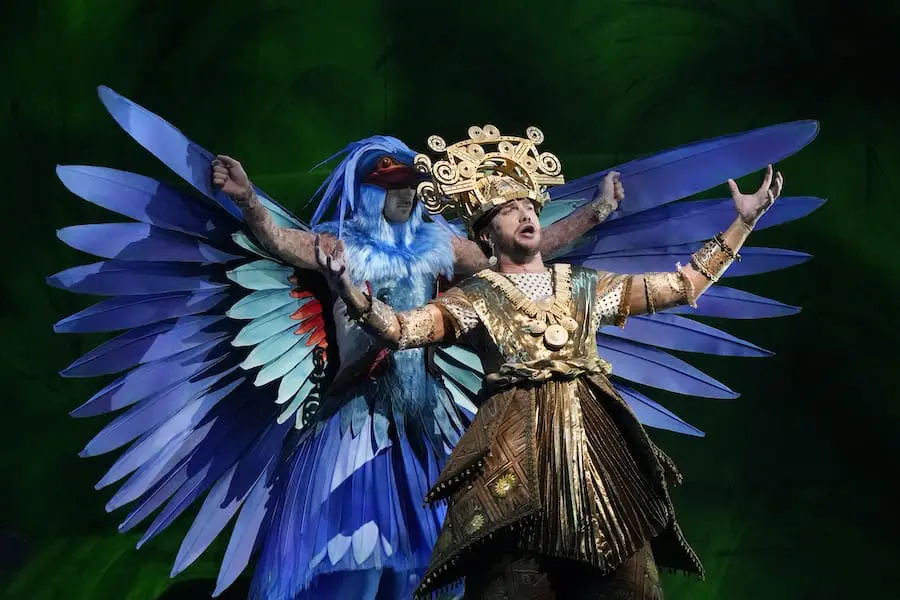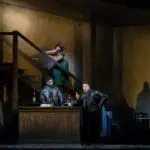“I’m Old Fashioned”—that lilting Jerome Kern standard popped unbidden into my head as Florencia en el Amazonas unfolded at the Metropolitan Opera. Its title sang to me with two distinct “I”s: there was, on the one hand, Daniel Catán’s unfashionably old-fashioned opera, communicating in its colourful, singable way, and on the other there was me, with my stubborn preference for operatic oldies-but-goodies over most twenty-first-century ventures in the genre. On this particular late-November evening (the 27th), the two of us happily met.
Florencia made its debut in Houston in 1996, just four years short of the millennium. but its sound world dates back multiple decades before that, to “the early 1900s” of its scenario, the era of Puccini and Debussy and of Granados’s Goyescas and de Falla’s La vida breve, the only two Spanish-language operas to have preceded it (in 1916 and 1926, respectively) at the Met. De Falla and Granados were native Spaniards; Catán (1949–2011) was Mexican, and Florencia adds a distinct Latin American flavor to the mix, a sinuous, gently rhythmic pulse that seductively traces the heroine’s eventful steamboat journey on the Amazon toward the improbably situated opera house in Manaus, Brazil. (In Riccardo Hernández’s handsome, evocative set designs, it looms, distant and unreachable, over the opera’s final scene.) Marcela Fuentes-Berain’s libretto salutes the magical realism of Gabriel García Márquez without any slavish borrowing. It’s all about love: the world-famous opera diva Florencia Grimaldi, traveling incognito, aspires to a reunion with the lover of her youth, a butterfly hunter named Cristóbal, long ago vanished into the rainforest; a young couple discover their love; a quarrelsome middle-aged husband and wife rekindle theirs. Interacting with them but standing slightly apart are the ship’s Captain and a factotum crewman called Riolobo, who’s actually a river spirit in disguise. It’s he who, in mufti at the opera’s start, sets the scene, and it’s he who, supernaturally gilded and bejeweled for the first-act finale, intercedes with the Amazonian gods to save the El Dorado from the ravages of a tropical storm. In between, a writer’s notebook is nearly lost, a marinated iguana is served (paired with a nice rosé), a bottle of champagne falls overboard, cards are played—in short, most of the action is small-scale, not grand. But the opera’s seventeen scenes are artfully varied, with solos, duets, and larger ensembles (all gratefully written for the voice), and none outlasts its welcome—a rare trait among the Met’s recent novelties. In fact, the entire two-act Florencia clocks in at just two hours and fifteen minutes—and that includes the half-hour intermission,
The Met honored Catán with a fine production. Director Mary Zimmerman was wise to expand her focus well beyond the confines of the El Dorado and instead conjure up its river-and-rainforest surroundings, their denizens brought to magical life by a team of elaborately dressed dancers: there’s a hummingbird and a heron, a pesky monkey on puppet strings, a school of piranhas swimming via the dancers’ headgear. (Ana Kuzmanić’s terrific costumes, for the human animals as well as the fish and the fowl, fully merit their current scrutiny in Vogue.) Alex Sanchez’s choreography kept the fauna in fluid motion.
The singers were all first-rate. Bass-baritone Greer Grimsley made a strong, sympathetic Captain; mezzo-soprano Nancy Fabiola Herrera and baritone Michael Chioldi bickered caustically and reconciled affectingly; and as their younger and dewier-eyed counterparts, soprano Gabriella Reyes and tenor Mario Chang joined voices to lovely effect. As Riolobo, baritone Mattia Olivieri projected a benevolent bemusement as crewman and a numinous authority as river spirit; he sang beautifully as both. And soprano Ailyn Pérez—to whose evident gifts I’ve been slow to warm—sang an often gorgeous Florencia, with a plush midrange and cherishable pianissimi on high. Yannick Nézet-Séguin led the orchestra with an audible strong affection for Catán’s colours and rhythms.
Any cavils? I wish the English text, awkwardly projected onto the curving scenery, had been more easily legible. I wish the leading lady had exuded a little more prima-donna grandeur and that, for greater contrast, she and Reyes had sounded less timbrally alike. I wish the Met’s head maestro had resisted the temptation to amp up the volume at the end of act 1, at the eloquent Olivieri’s expense. And I wish that, for all its pervasive prettiness, Catán’s score contained at least one tune as memorable as “I’m Old Fashioned.” But pushing all that aside, the two “I”s enjoyed a very good evening at the Met.
Related Content ↘
Opera Canada depends on the generous contributions of its supporters to bring readers outstanding, in-depth coverage of opera in Canada and beyond. Please consider subscribing or donating today.















